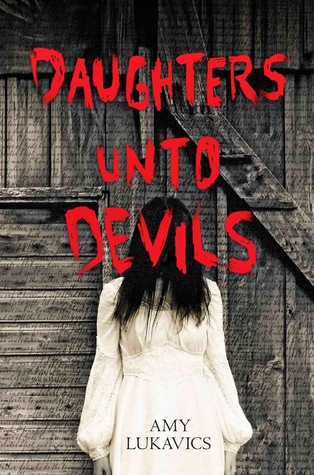This is part 1 of 4 where I asked debut authors whose novels I included in my Library Journal column to share their inspiration-- the books or authors which are their favorite scariest reads.
First up is Amy Lukavics, author of Daughters Unto Devils.
by Amy Lukavics
My favorite horror novel of all time is Pet Sematary by Stephen King. As a child who was obsessed with reading, I couldn't get my hands on enough scary stories, even at a young age. After seasoning myself with Goosebumps, Fear Street, and Scary Stories to Tell in the Dark books, I was ready to try something longer and darker. This book sat in all its hardcover glory on my mother's bookshelf, alongside Firestarter, It, and The Tommyknockers. I think it's safe to say that it was love at first sight.
When I discovered Pet Sematary, I knew by the cover that it would be terrifying. I picked through the pages, scanning for scenes that were especially horrific (and finding many.) As I grew older and read more adult books, I finally felt ready to try and tackle Pet Sematary in whole, from beginning to end. This marked the beginning of a month-long period where every night was spent shivering beneath the covers in the dark, terrified to my very bones that at any moment, Zelda was going to crawl out from under the bed and break my spine like it was nothing more than a twig.
The story captures the essence and purpose of horror better than anything I've ever read, even to this day. It explores the deep, guttural fear of death that most people are too afraid to explore, as well as what we tell ourselves in order to bring comfort. It's about the struggle to accept death as a constant, to feel at peace with something that is both inevitable and ultimately uncertain. The main character, Louis Creed, finds himself at odds with his wife when they are forced to try and explain death to their young daughter, Ellie. Because of previous life experiences, the couple sits on different sides of the fence, and Louis has a hard time coming to terms with his wife Rachel's approach.
The major horror element of the book supports and emphasizes the theme to create a terrifying but perfect harmony: the presence of an ancient burial ground that can bring anything buried in its soil back from the dead. Only, they don't come back as themselves, not even close.
Louis Creed thought he knew how he felt about death, but like many of us, wasn't forced to face the full enormity of emotions that came along with it until tragedy hit close to home. And when that point came, pivotal questions arose: how far was he really willing to go to try and undo something permanent? How far would his grief push him, and what effect would it have on the ones he loved the most? Louis was well aware that the soil of the burial ground had soured, that the people who originally used it had stopped for a reason. And yet, logic went out the window in order to accommodate his panic and sheer unwillingness to accept his reality that had been newly ruined by death.
All in all, the tale spoke to me on many levels. Stephen King is often referred to as the master of horror, but the effect this book had on me was truly profound. It influenced my horror tastes and drove me to think of something, anything, even half as creative as Pet Sematary. It made me strive to tap into those deeply embedded, more visceral horrors that come along with being human, and somehow display them in my fiction as unapologetically as King had.
The influence was clear in my first horror novel, Daughters unto Devils, about a girl in the 1800's named Amanda Verner who is forced to move from her cabin in the mountains to a vast stretch of prairie lands, where something evil may or may not be afoot. So many of Amanda's challenges, like those of Louis Creed, come from internal struggles that put her at odds with her personal beliefs.
Such struggles can be talked about plainly and openly in horror; perhaps one of the reasons why I find the genre so important beyond the entertainment factor of ghosts and demons. There are so many things that scary stories can teach us, about ourselves and others.
If we're afraid of something, there's a reason why. And in exploring that 'why,' we find the opportunity to become more self aware and grounded as individuals.





No comments:
Post a Comment